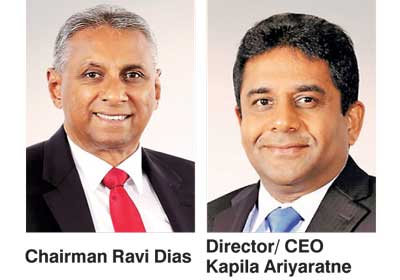Wednesday Feb 25, 2026
Wednesday Feb 25, 2026
Thursday, 27 April 2017 00:00 - - {{hitsCtrl.values.hits}}
Seylan Bank made a steady start in 2017 by posting impressive results for Q1 with a Profit After Tax of Rs. 866 million in the backdrop of uncertain market conditions.
The bank increased its Net Interest Income and recorded a robust growth of 20.97% in spite of the mounting pressure on the margins due to rising cost of funds. 
However Net Interest Margin contracted from 4.19% in 2016 to 3.92% in 1Q 2017 due to cost of deposits increasing at a faster rate than the re-pricing of loans.
Net fee and commission income witnessed a healthy growth of 24.94% to reach Rs. 869 million in 1Q 2017 as compared to Rs. 695 million for the comparative period. This was mainly attributed from core banking related business such as card-related income, trade finance related fee income and fees from guarantees, remittances, etc. The bank will continue to look towards enhancing its fee-based income from products such as debit and credit cards and trade-related products.
Other operating income comprising net gains from trading, gains from financial investments, gains on foreign exchange and other income reported a net gain of Rs. 299 million compared to loss of Rs. 68 million in 1Q 2016.
Impairment charges for loans and other losses for the period was a charge of Rs. 346 million as compared to a charge of Rs. 84 million in Q1 2016. Individual impairment charges of Rs. 253 million represent specific provisions made for few credit exposures. The bank has a stringent recovery process in place to minimise any significant losses that may arise from such loan facilities.
Total expenses recorded an increase of 19.03% from 2,273 million in the 1Q of the previous year to Rs. 2,705 million during the period under review. Expenses growth was witnessed by investments made in employees, technology, upgrading and refurbishment of branches etc.
Cost efficiency and productivity has taken a predominant role in the bank’s day-to-day operations. The bank continues to focus on cost initiatives coupled with implementation of lean concepts and exploring ways of inculcating a culture of working smarter across all the functions by the employees.
The bank’s loans and advances portfolio recorded a marginal growth of 2.76% to 242,531 million during the 1Q 2017 amidst rising interest rates. The growth in credit was driven primarily by term loans, overdrafts and credit cards.
The overall deposit base recorded a marginal growth of 0.24% from Rs. 273,456 million by the corresponding quarter last year to 274,120 million by 1Q 2017 and a shift from low cost CASA to term deposits was noted which is partly due to increase in interest rates.
As a result the bank’s CASA ratio (Current and Savings) stood at 31.23% and total time deposits increased from 67.48% by end of year 2016 to 68.77% as at 31 March of the total deposits base. An attractive Avurudu campaign were launched for ‘Avurudu Thanpathu’ deposits and Tikiri Account holders to grow the existing balances and acquire new customers.
As a result of the noteworthy financial performance during the first quarter, the bank’s Earnings per Share (EPS) grew by 20.2% to Rs. 2.51. The bank recorded a Return on Average Assets (ROAA) of 1.39% and Return on Equity (ROE) of 12.37%. The bank’s Net Asset Value per share as at 31 March was Rs. 79.74 (Group Rs. 83.12).
Seylan Bank remained soundly capitalised, with the key capital adequacy ratios well above the regulatory minimum requirements and recorded 10.39% as the core capital adequacy ratio and 12.63% as the total capital adequacy ratio.
The bank recognises education as one of the building blocks of the nation and considers it as a priority area for its CSR activities. Under the ‘Seylan Pahasara’ project the bank opened eight libraries during the first quarter which add up to total of 128 libraries in rural areas, especially in under privileged schools with the aim of nurturing young minds and to educate them so that they contribute to the nation’s development.